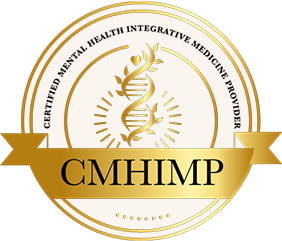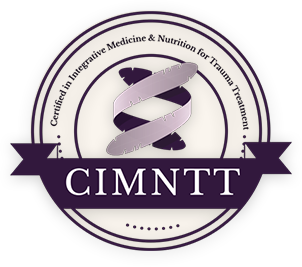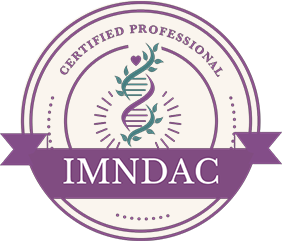Certification
The Ketogenic Diet as a Supportive Therapy for Children with Autism Spectrum Disorder
The ketogenic diet (KD), long used to treat drug-resistant epilepsy, is now gaining attention as a potential intervention for various neurodevelopmental and neuropsychiatric disorders. Among these, autism spectrum disorder (ASD) stands out as a key area of emerging research.

There is no one-size-fits-all approach to nutrition, as there is no one right diet for everyone. The diet that better fuels our engine is determined by a complexity of genetic/cultural/environmental determinants. Each individual has a unique physiological and emotional makeup that influences how they respond to food, nutrients, and therapeutic interventions. For some children with autism spectrum disorder (ASD), a high-fat, low-carbohydrate ketogenic diet (KD) can be transformative. Yet, this diet is not for everyone and must be considered within each person's individual needs, family context, and clinical supervision.
The ketogenic diet was originally developed to help manage epilepsy in children. It works by shifting the body into ketosis, a state where ketone bodies produced from fat become the primary fuel source for the brain instead of glucose. This shift in brain metabolism can have broad neurochemical effects, from mitochondrial health to neurotransmitter balance and inflammation.
Typically, on a KD, between 50% and 80% of calories come from fat sources like butter, heavy cream, coconut oil, eggs, avocado, and raw nuts, while carbohydrates and protein make up the rest. High-carbohydrate foods such as sugar, grains, and starches are avoided. By eliminating glucose as the primary energy source, the body is encouraged to burn fat for fuel, which can calm neural excitability and support brain resilience.
Some kids with ASD, especially those who also have seizures, may benefit from the ketogenic diet. But it’s important to know that this diet can sometimes cause side effects like constipation, dehydration, or kidney stones. Drinking plenty of water, eating enough fiber, and having regular check-ins with a healthcare provider can help prevent these problems. Because of this, it’s best to follow the diet with support from experienced professionals.
Emerging research continues to explore how the KD may improve behavior and cognition in children with ASD, often through its effects on the gut-brain axis. Below are six key studies illuminating the KD’s multi-dimensional impact:
The first study followed children with ASD on a modified ketogenic diet for four months. Researchers observed reduced levels of proinflammatory cytokines and changes in brain-related microRNAs. The diet also shifted the gut microbiome. These biological changes may help explain earlier improvements in sociability, potentially through reduced inflammation and effects on the BDNF pathway.
The second study is a narrative review examining how the ketogenic diet might help with autism spectrum disorder. It points to several possible ways the diet works: by boosting energy metabolism, reducing inflammation, balancing neurotransmitters and gene activity, and influencing the gut microbiome.
The third study is a review examining the potential of the ketogenic diet as a multifaceted treatment for autism spectrum disorder. It discusses how the diet may influence metabolic and neuroprotective pathways disrupted in ASD. This review highlights the promise of the ketogenic diet to target multiple pathways simultaneously but calls for more human research and suggests that precision medicine could help identify which individuals might benefit most.
The fourth study reviews the therapeutic role of the ketogenic diet in various neurological disorders, including ASD. It explains how the KD shifts metabolism from carbohydrates to fat, providing ketone bodies as an alternative source of energy for the central nervous system. The review highlights the diet’s potential benefits across multiple neurologic disorders like migraine, motor neuron disease, ASD, multiple sclerosis, drug-resistant epilepsy, and neurotrauma.
The fifth study is a scoping review that examined 30 studies on the ketogenic diet’s effects across various neuropsychiatric disorders, including ASD, ADHD, bipolar disorder, depression, anxiety, and seizure disorders. The review found evidence suggesting the KD may improve symptoms in these conditions, but results are heterogeneous and more rigorous research is needed. It emphasizes that while promising, the KD should be considered within individualized treatment plans, and clinicians must weigh both its potential benefits and limitations.
The sixth study is a review that looks at both animal and human research on using the ketogenic diet and ketone supplements to treat common neurodevelopmental disorders like ASD and ADHD. It covered 14 animal studies and 10 clinical ones. Because the studies varied a lot in methods and measurements, the authors concluded that the research on this topic is still pretty new. However, since ketogenic diets and supplements are generally safe and well-tolerated, they suggest more clinical studies to explore how effective these treatments might be.
Tags: Ketogenic diet, autism spectrum disorder, ASD, neurodevelopmental disorders, gut microbiota, behavioral therapy, nutritional intervention, inflammation, cognitive function
Interested in Learning More?
- Course(s): Mental Health Disorders
- Course(s): Food as Medicine: Take Charge of Your Health
- Book(s): The Brainbow Blueprint
- Book(s): Nutrition Essentials for Mental Health
Research Glossary
Research has its own vocabulary. To help you decipher research, I created a Glossary to ease the way. You may access it here: Research Glossary
Referenced Research Publications
Nutrients
2024, May 07
DOI: 10.3390/nu16101401
Ketogenic Diet Induced Shifts in the Gut Microbiome Associate with Changes to Inflammatory Cytokines and Brain-Related miRNAs in Children with Autism Spectrum Disorder
Abstract
In this interventional pilot study, we investigated the effects of a modified ketogenic diet (KD) on children with autism spectrum disorder (ASD). We previously observed improved behavioral symptoms in this cohort following the KD; this trial was registered with Clinicaltrials.gov (NCT02477904). This report details the alterations observed in the microbiota, inflammation markers, and microRNAs of seven children following a KD for a duration of 4 months. Our analysis included blood and stool samples, collected before and after the KD. After 4 months follow up, we found that the KD led to decreased plasma levels of proinflammatory cytokines (IL-12p70 and IL-1b) and brain-derived neurotrophic factor (BDNF). Additionally, we observed changes in the gut microbiome, increased expression of butyrate kinase in the gut, and altered levels of BDNF-associated miRNAs in the plasma. These cohort findings suggest that the KD may positively influence ASD sociability, as previously observed, by reducing inflammation, reversing gut microbial dysbiosis, and impacting the BDNF pathway related to brain activity.
Keywords: BDNF; autism spectrum disorder; butyrate; inflammation; ketogenic diet; miRNA; microbiome.
Reference
Allan, N. P., Yamamoto, B. Y., Kunihiro, B. P., Nunokawa, C. K. L., Rubas, N. C., Wells, R. K., Umeda, L., Phankitnirundorn, K., Torres, A., Peres, R., Takahashi, E., & Maunakea, A. K. (2024). Ketogenic Diet Induced Shifts in the Gut Microbiome Associate with Changes to Inflammatory Cytokines and Brain-Related miRNAs in Children with Autism Spectrum Disorder. Nutrients, 16(10), 1401.
https://doi.org/10.3390/nu16101401
Metabolic brain disease
2024, December 18
DOI: 10.1007/s11011-024-01506-5
Ketogenic diet as a therapeutic approach in autism spectrum disorder: a narrative review
Abstract
The ketogenic diet (KD) originated in the 1920s. It is a dietary model that is low in carbohydrates, adequate in protein, and high in fat content. The diet mimics starvation and increases the production of ketone bodies, leading to ketosis in metabolism. KD is used as an anticonvulsant treatment approach in patients with drug-resistant epilepsy. In addition, it is thought that a KD may have therapeutic potential in the treatment of neurological disorders, including autism spectrum disorders (ASD). Numerous recent studies have demonstrated that a KD can improve behavioural parameters in individuals with ASD. This review aims to address the potential mechanisms of action of the KD and to examine the effects of the KD on individuals diagnosed with ASD. It is likely that this role is mediated through improvements in energy metabolism, reduction of pro-inflammatory cytokine levels, control of neurotransmitters, gene expression and modulation of the gut microbiota. Based on the available evidence, a KD appears to be a safe and effective treatment for ASD.
Keywords: autism spectrum disorders; intervention; ketone bodies; neuroprotection; nutrition.
© 2024. The Author(s), under exclusive licence to Springer Science+Business Media, LLC, part of Springer Nature.
Reference
Öztürk, E., Aslan Çin, N. N., Cansu, A., & Akyol, A. (2024). Ketogenic diet as a therapeutic approach in autism spectrum disorder: a narrative review. Metabolic brain disease, 40(1), 67.
https://doi.org/10.1007/s11011-024-01506-5
Metabolic brain disease
2025, January 08
DOI: 10.1007/s11011-024-01518-1
Exploring the potential of the ketogenic diet in autism spectrum disorder: metabolic, genetic, and therapeutic insights
Abstract
Current treatment approaches for Autism spectrum disorder (ASD) primarily focus on symptom management rather than addressing underlying dysfunctions. The ketogenic diet (KD), a high-fat, low-carbohydrate diet inducing nutritional ketosis, has shown promise in treating epilepsy and may offer therapeutic benefits for ASD by modulating metabolic and neuroprotective pathways. This review examined the potential impact of KD on underlying mechanisms in ASD. While evidence from human studies on underlying mechanisms is limited, animal research has shown a large overlap of mechanisms modulated by KD and dysfunctions in ASD. As such, targeting multiple disrupted pathways at once, KD presents a potential multifaceted treatment approach for ASD. However, more evidence from human studies is needed on the effectiveness of KD in the modulation of underlying dysfunctions in ASD. Additionally, precision medicine approaches could help identify individuals who would benefit most from the intervention, potentially extending its use to other psychiatric conditions with similar metabolic patterns. Consequently, KD interventions might show the potential to induce a drastic paradigm shift in understanding and treating ASD.
Keywords: Autism spectrum disorder; Ketogenic diet; Metabolic psychiatry.
© 2025. The Author(s).
Reference
Schrickel, A., Groeneweg, J., & Dekeyster, E. (2025). Exploring the potential of the ketogenic diet in autism spectrum disorder: metabolic, genetic, and therapeutic insights. Metabolic brain disease, 40(1), 94. https://doi.org/10.1007/s11011-024-01518-1
Curēus
2024, September 05
DOI: 10.7759/cureus.68697
Fueling Recovery: The Therapeutic Role of Ketogenic Diet in Neurological Pathologies
Abstract
The ketogenic diet (KD) has gained a lot of attraction in the management of neurological disorders. KD therapies are high-fat, low-carbohydrate diets intended to shift energy consumption and metabolism from carbohydrates to fat in ketogenesis. The oxidative phosphorylation of ketone bodies generates energy packets for body cells, especially the central nervous system, replacing the role of glucose. KD can benefit multiple neurologic disorders like migraine, motor neuron disease, autism, multiple sclerosis, neuro-oncology, drug-resistant epilepsy, and neurotrauma. KD can provide significant adjuncts to limited conventional therapies, highlighting the feasibility, safety, and potential efficacy in neurology and neurosurgical disease management.
Keywords: brain; cancer; epilepsy; fat; keto diet; ketogenic; migraine; spine; traumatic brain injury; tumor.
Copyright © 2024, Khan et al.
Reference
Khan, A. Y. Y., Khalid Rana, M. A., Mehmood Qadri, H., & Amir, A. (2024). Fueling Recovery: The Therapeutic Role of Ketogenic Diet in Neurological Pathologies. Cureus, 16(9), e68697. https://doi.org/10.7759/cureus.68697
Progress in neuro-psychopharmacology & biological psychiatry
2025, January 10
DOI: 10.1016/j.pnpbp.2024.111205
Measuring the effects of ketogenic diet on neuropsychiatric disorder: A scoping review
Abstract
Objective: This scoping review aims to examine the available literature on the ketogenic diet's (KD) efficiency as a potential therapeutic intervention for various neuropsychiatric disorders.
Introduction: The KD is a high-fat, low-carbohydrate diet that has been studied for its potential benefits in managing neuropsychiatric disorders. However, the extent of its effectiveness across a spectrum of these conditions remains unclear.
Inclusion criteria: The study designs considered eligible encompassed randomized and non-randomized controlled trials, retrospective and prospective observational studies, and comparative effectiveness assessments. The criteria for including each study were specifically related to neuropsychiatric disorders, referring to the DSM-5 coding guidelines.
Methods: A systemic search was performed by an experienced reference librarian across multiple databases to pinpoint studies relevant to the influence of the ketogenic diet on neuropsychiatric disorders. All relevant articles were included that ranged over the last thirteen years. All relevant records identified were compiled into the Covidence systematic review software.
Results: A total of 30 studies were reviewed, which reported effects of the KD on neuropsychiatric disorders, including improvements in Global Developmental Delay, Childhood Autism, Attention Deficit/Hyperactivity Disorder (ADHD) symptoms, psychotic symptoms, Bipolar and Related Disorders, Depressive Disorder symptoms, anxiety symptoms, eating disorders, Substance-Related and Addictive Disorders, Major and Mild Neurocognitive Disorders, and Seizure Disorders.
Conclusion: The KD may serve as a promising therapeutic intervention for various neuropsychiatric disorders. However, the evidence is heterogeneous, and further rigorous research is needed to establish the KD as a standard treatment for these disorders and to understand the underlying mechanisms of its effects.
Implications for practice: This review underscores the need for healthcare professionals to consider the potential benefits and limitations of the KD when managing patients with neuropsychiatric disorders. It also highlights the importance of individualized treatment plans based on the specific needs and responses of each patient.
Keywords: Anxiety disorder; Autism; Cognitive impairment; Depressive disorder; Eating disorder; Epilepsy; Ketogenic diet; Neuropsychiatric disorder; Parkinson's disease.
Copyright © 2024 Elsevier Inc. All rights reserved.
Reference
Yousufzai, W., Singh, M., Ahmadi, L., Balamurali, S., Bavishi, D., Ashraf, S., Stuart, D. B., Baronia, R., & Amor, W. (2025). Measuring the effects of ketogenic diet on neuropsychiatric disorder: A scoping review. Progress in neuro-psychopharmacology & biological psychiatry, 136, 111205. https://doi.org/10.1016/j.pnpbp.2024.111205
Frontiers in nutrition
2024, December 19
DOI: 10.3389/fnut.2024.1485280
Exogenous ketone bodies and the ketogenic diet as a treatment option for neurodevelopmental disorders
Abstract
Background: Despite being the most prevalent neurodevelopmental disorders, there are comparatively few treatment options available to patients presenting with autism spectrum disorder (ASD) and attention deficit hyperactivity disorder (ADHD). The ketogenic diet has historically shown therapeutic utility in treating refractory epilepsy, an adjacent neuropsychiatric condition, in children, adolescents and adults. The following review explores preclinical and clinical literature focusing on the therapeutic potential of the ketogenic diet and exogenous ketone body supplementation in treating common neurodevelopmental disorders.
Method: A narrative review of extant literature was conducted across the domains of perinatal nutrition, ASD, and ADHD. Preclinical and clinical studies focusing on the effect of either the ketogenic diet or exogenous ketone supplementation as a treatment option were included for review.
Results: 14 preclinical and 10 clinical studies were included for discussion. Data supporting the use of a ketogenic intervention for neurodevelopmental disorders is mixed. High heterogeneity in study design was noted for preclinical models, ketogenic intervention, and outcomes measured.
Conclusion: Studies evaluating ketogenic interventions for neurodevelopmental disorders remain in their infancy in terms of both the depth and scope of available literature. The safety and tolerability of ketogenic diets and supplements means there would be value in exploring their effectiveness further in clinical studies.
Keywords: ADHD; ASD; BHB; autism; ketogenic diet; ketone bodies; ketones; neurodevelopment.
Copyright © 2024 Omori, Malys, Woo and Mansor.
Reference
Omori, N. E., Malys, M. K., Woo, G., & Mansor, L. (2024). Exogenous ketone bodies and the ketogenic diet as a treatment option for neurodevelopmental disorders. Frontiers in nutrition, 11, 1485280. https://doi.org/10.3389/fnut.2024.1485280
















